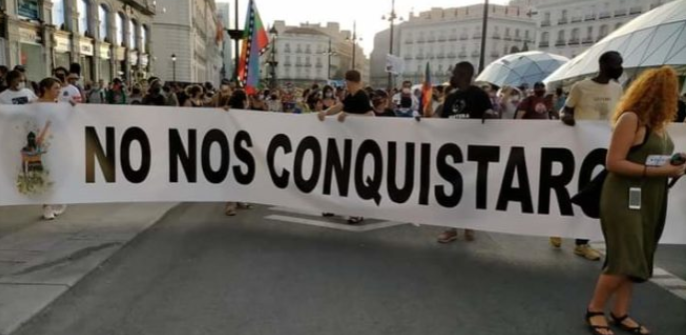
by Luís Hernandez Navarro
The Plaza de Colón, in Madrid, is the emblematic heart of the Spanish ultra-right and its fantasies of recovering its lost imperial grandeur. It is here that the sympathizers of Vox and the Partido Popular (Popular Party) hold their mobilizations. In what was a tremendous symbolic blow, the seven members of Squadron 421 of the EZLN and some 2,500 European insubordinates arrived there last August 13.
On that day, Vox attested to its incurable colonialism in a tweet. On this day 500 years ago today, a troop of Spaniards led by Hernán Cortés and native allies achieved the surrender of Tenochtitlan. Spain managed to liberate millions of people from the bloodthirsty and terrifying regime of the Aztecs. Proud of our history, he said.
But neither that outburst nor others prevented the internationalist rebels from putting the skewers to the ideological heirs of Francisco Franco and the nostalgic Spaniards. Five centuries after the Castilian-Leonese, Andalusian, Extremaduran and La Mancha invasion, a ship with the Zapatista delegation on board, sheltered by a crowd coming from many latitudes, sailed the asphalt streets of the capital of the kingdom, from the Puerta de Sol to the Plaza de Colón, making the conquest in reverse. And, as if to refute Vox’s tweet (and to all those who identify with it on both sides of the Atlantic), a huge banner announced: They did not conquer us! (https://bit.ly/37O0umf).
Previously, upon disembarking in the port of Vigo last June 22, the Zapatistas had already renamed Europe as Slumil K’ajxemk’op Unsubmissive Land.
With the Plaza de Colón as a stage, the “inopportune” members of Squadron 421 took the floor. “To live,” they said, “is not only not to die, it is not to survive. To live as human beings is to live with freedom. To live is art, science, joy, dance, and struggle.”
“This is how they lead us, day and night, wanting to tame us, seeking to domesticate us. And we, well, resisting. All our lives and entire generations resisting, rebelling. Saying ‘no’ to the imposition. Shouting ‘yes to life.’ It is not new, it is true. We could go back five centuries and the same story.”
In explaining the purpose of their expedition in those lands, they pointed out: “we think and we know that we are not the only ones who struggle, that we are not the only ones who see what is happening and what will happen. Our corner of the world is a small geography of struggle for life. We are looking for other corners and we want to learn from them.”
To conclude the course of their mission, after pointing to capitalism as responsible for the evils suffered by humanity and nature, they asked their counterparts: “When one day someone asks you ‘why did the Zapatistas come,’ together we can answer, without shame for you and without shame for us, ‘they came to learn.’ 500 years later, the Zapatista communities came to listen to us”.
The Zapatista mobilization in Europe marks a turning point in the struggles and discourse of the native peoples of Latin America and in the uses of the past. Beyond lamentations and denunciations, far from immobilizing victimhood, without refusing to call a spade a spade, in the perspective of a new internationalism, it bets on the construction of networks from below and on the left with those who fight against capitalism.
Forty-two years ago, in The New Political Presence of the Indians: A Challenge to Latin American Creativity, Guillermo Bonfil documented how the Indians of the continent have their own voice, despite the fact that the colonizing Europeans and the native bourgeoisies insist on denying it. We continue to dream of homogeneous nations, with one culture, one language, one race, despite being societies made up of diverse peoples, he wrote.
According to the anthropologist, the projects of the Indian peoples expressed through the recently created ethnic political organizations (early 1970s) have been implicit in their secular resistance. However, there is something new in them: a political ideology oriented to the change of Latin American societies and not only to the preservation of the ethnic groups themselves. These organizations, he pointed out, have in common the decision of the Indian peoples to act as distinct political units.
Bonfil described the main ideas of this emerging Indian political thought. For example, the historical continuity of the peoples and the conviction that there was no conquest, but invasion. In the face of it, the Indian has resisted and fought. Thus, imperialism and colonialism are the way of Western civilization, not a moment in its historical trajectory.
Such a program claims -according to him- to retake the thread of history, not to return to the past and stay there. It is about updating a colonized history, liberating it and building on it; ending a chapter, closing the parenthesis, turning the page and moving on. From this perspective, this exercise is a powerful call to the future.
Without putting aside the legacy of this thought, Zapatismo changes the terrain of the struggle and the indigenous discourse, and places as the core of its proposal the struggle for life within the framework of an anti-capitalist project, and the weaving of a transnational community of all the “extemporaneous” based on walking by asking questions. It not only proclaims it, but puts it into action. This is the deep meaning of the mobilization of last August 13.
This article was published in La Jornada on August 17th.
https://jornada.com.mx/2021/08/17/opinion/017a2pol
It has been republished with English interpretation by Schools for Chiapas.
